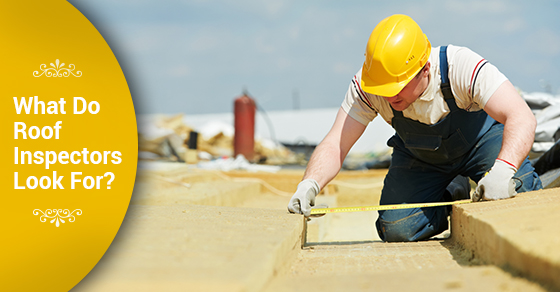
January 15, 2016
What Do Roof Professionals Look For During An Inspection?
A roof inspection is one of the most important things you can do to maintain the integrity and lifespan of your commercial roof. Inspections provide numerous benefits and can lower your maintenance and repair costs over time.

A professional roof inspection helps you identify any red flags that indicate the risk of more serious and costly issues in the future. Knowing what roof professionals look for during an inspection ensures that you take care of one of the most valuable parts of your commercial property.
Deck and Wall Inspection
A roof inspection includes the assessment of your commercial deck and walls. A trained inspector will look for any signs of damage, aging, or wear, which can be documented and shared with the property management and owners.
Some of the major issues that occur with roof decks and walls include poor flashing and the intrusion of water. When water penetrates the ledgers of the deck, the underlying materials can become corroded and rotted. This increases the risk of further damage.
Metal Flashings
Metal flashings are also assessed during a professional roof inspection. Metal roofing systems must be fastened appropriately to prevent issues such as leakage and corrosion.
Flashings, perimeters, and seams are areas where these issues typically occur. The materials can contract and expand over time, which can cause the sealant to lose its integrity.
High winds can cause parts to become loose and further compromise the strength of your roofing system.
Expansion Joints
Expansion joints must also be inspected to ensure proper function and extended performance of your commercial roofing system.
Expansion joints are essential to protecting your building and its roof. When expansion joints aren’t terminated properly, they can become damaged. A proper inspection will allow you to evaluate the rubber bellows and identify any openings or inappropriate materials that may have been used by a previous roofing service company.
Roof Dividers
Roofing dividers allow you to minimize the movement that can occur due to changes in temperature. By dividing the roof into separate parts, you reduce the amount of movement and ensure that it remains within a safe limit.
Inspecting your roof dividers is another way to prevent unwanted and costly roofing issues. By reducing the movement that occurs within your roofing system, you protect your building all year long during extreme changes in temperature.
The following are some other aspects of your roofing system that can be evaluated during your next inspection:
- Metal, cap, and counter flashings
- Ballast placement
- Drains
- HVAC equipment
- Conduit and pipe flashings
- Ballast displacement
When Do You Need an Inspection?
How often you get your roof inspected depends on a number of factors, but a regularly scheduled roof inspection will prevent costly damage over time. Also, there are some key signs that will indicate the need for a professional roof inspection. If you’ve experienced roofing leaks in previous years, then you should consider getting your roof assessed.
If you don’t have a maintenance program in place, then a roofing inspection will ensure that no issues are being ignored. Rising energy costs can also be an indication that there may be some roofing or insulation problems that need to be addressed by a professional.
A full inspection of your roof will determine if there are any maintenance or repairs that need to be performed to the exterior and interior aspects of your roofing system.
A professional inspection saves you money over time and maximizes the life and performance of your commercial roof. For more information, contact Empire Roofing today.
Back to Blog